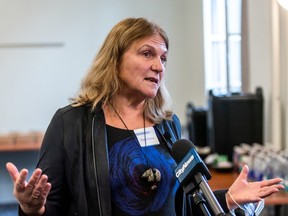A 2018 census counted 3,149 unhoused Montrealers on one given night. Advocates believe the number is now much higher.

In the last year alone, around 1,500 women have used the services at Montreal’s La Rue des Femmes shelter and health centre — at least 300 more than any year in recent memory.
It’s an increase the centre’s founder and director, Léonie Couture, believes is likely being felt by all resources for the unhoused across the city.
Sign up to receive daily headline news from the Montreal Gazette, a division of Postmedia Network Inc.
Thanks for signing up!
A welcome email is on its way. If you don't see it, please check your junk folder.
The next issue of Montreal Gazette Headline News will soon be in your inbox.
Officially, Montreal’s best understanding of how many unhoused people there are in the city dates back to 2018, when volunteers counted 3,149 people. Results from a similar census completed in the fall have not yet been released.
“But it must be more than 3,000 today, and we know that because we see the women here,” Couture said in an interview. “And even if there are 3,000 people, there are only 1,600 places (in shelters). That means there are still many people outside.”
On Tuesday, a team of researchers leading a Canada-wide study to better understand homelessness — and the number of people experiencing it — were in Montreal to host a forum and present some of their findings to date.
Since January 2021, the team has visited 28 communities across the country, including Montreal, to meet with local stakeholders and speak with people experiencing homelessness themselves.
The project aims to put a more accurate count on the number of unhoused people in Canada and determine sources, such as provincial health data, that can help provide a clearer picture.
“Data is so important. It allows us to understand the extent of the problem … and be able to put solutions in place to improve the situation,” Michèle Chappaz, director of the Mouvement pour mettre fin à l’itinérance à Montréal, told the forum on Tuesday.
“We know homelessness is like an iceberg: we only see what’s visible,” Chappaz added. “But underneath are all the people we don’t see or those in a precarious situation who are at risk of becoming homeless.”
The research project is funded by the federal government and led by the Lawson Health Research Institute in London, Ont.
In an interview, the institute’s Dr. Cheryl Forchuk said developing a more accurate count is crucial for cities and communities looking to ensure they have the needed resources and services.
Though communities traditionally rely on counts such as the ones carried out in Montreal — known as point-in-time counts — the study is looking into how health databases can complement the findings.
Forchuk said data so far collected in Ontario suggests the homelessness rate might be three times higher than first believed. She suspects data from Quebec and other provinces could yield similar results.
“The current federal numbers suggest there are 235,000 people experiencing homelessness across the entire country over the course of a year,” she said. “If you look around in the communities, you don’t need to be a scientist to suspect that’s probably not accurate.”
In all, researchers met with 400 unhoused people to better understand the factors contributing to their situation.
They found that nearly 16 per cent of participants had only experienced homelessness for the first time during the pandemic. Roughly 75 per cent had also been involved with the criminal justice system, likely affecting their access to housing.
The research included both large urban centres and more rural communities, where data proved harder to come by.
“There are a lot of smaller rural communities that don’t have any resources (for the unhoused), and therefore have no data. And because of that lack of data, they therefore have no resources,” Forchuk said. “It’s a bit of a vicious cycle.”
In an email response, a spokesperson for the city of Montreal said the city still relies on the results from the 2018 count to assess the resources needed.
The spokesperson noted the 1,600 spaces now available in shelters is the most Montreal has ever had, and an increase from 900 spaces five years ago.
Results from the count completed in October should be released in the spring, they added.
Attending Tuesday’s forum, Émilie Fortier, director of emergency services at Montreal’s Old Brewery Mission, said having more precise data can allow shelters to better tailor their services.
Like Couture, she believes the number of unhoused people in Montreal to be much higher than in 2018.
“I think it’s really obvious to anyone who lives in Montreal that visible homelessness has increased,” she said. “And it’s for that group that we need to reflect, as a society in Montreal, on how to develop other solutions.”
jfeith@postmedia.com
-

New sites not enough to shield Montreal's unhoused from the cold, groups fear
-

'We’re here to listen': Volunteers talk to unhoused Montrealers for census
-

COP15 security measures hurting people in need, Montreal's 'street priest' says


